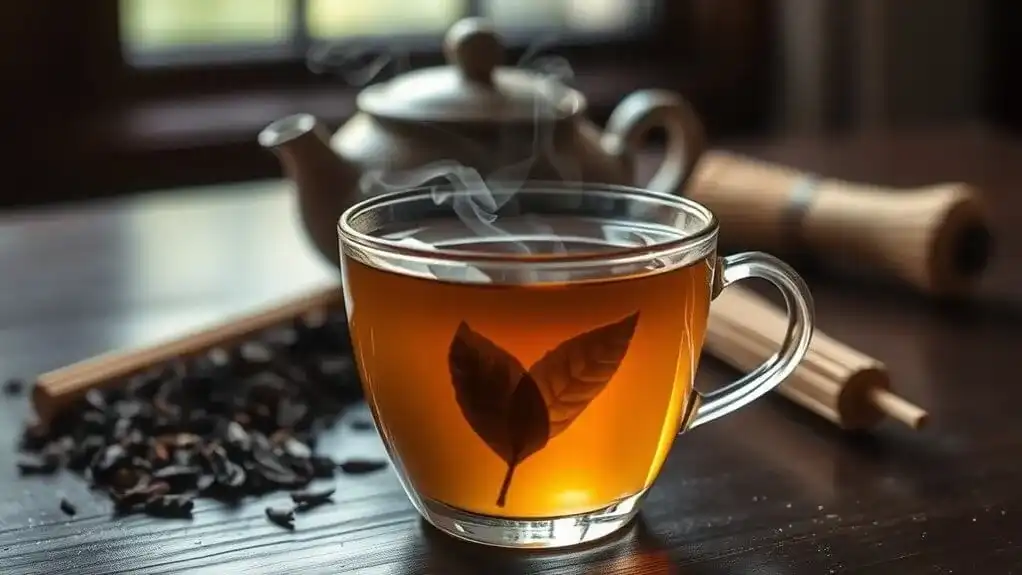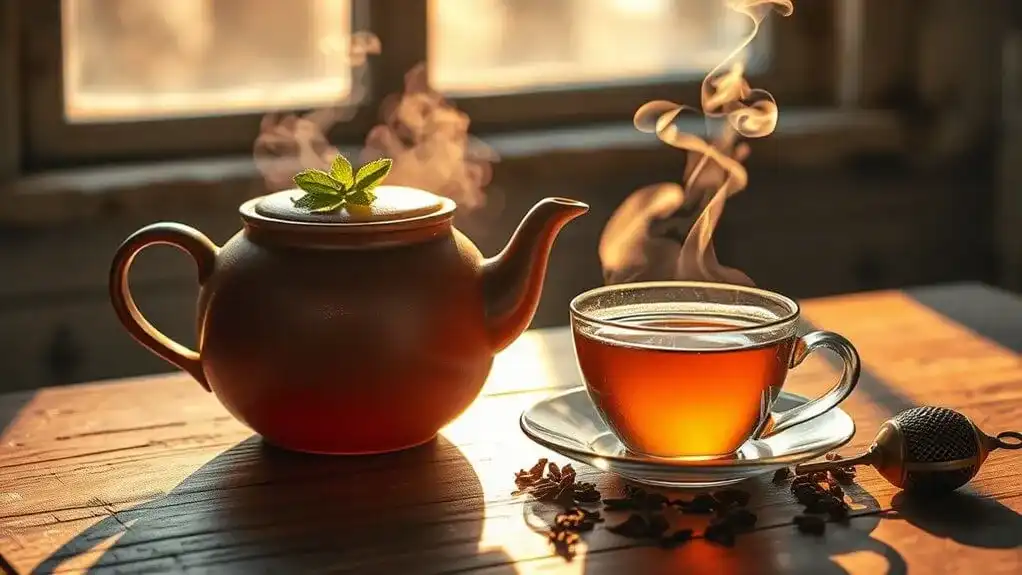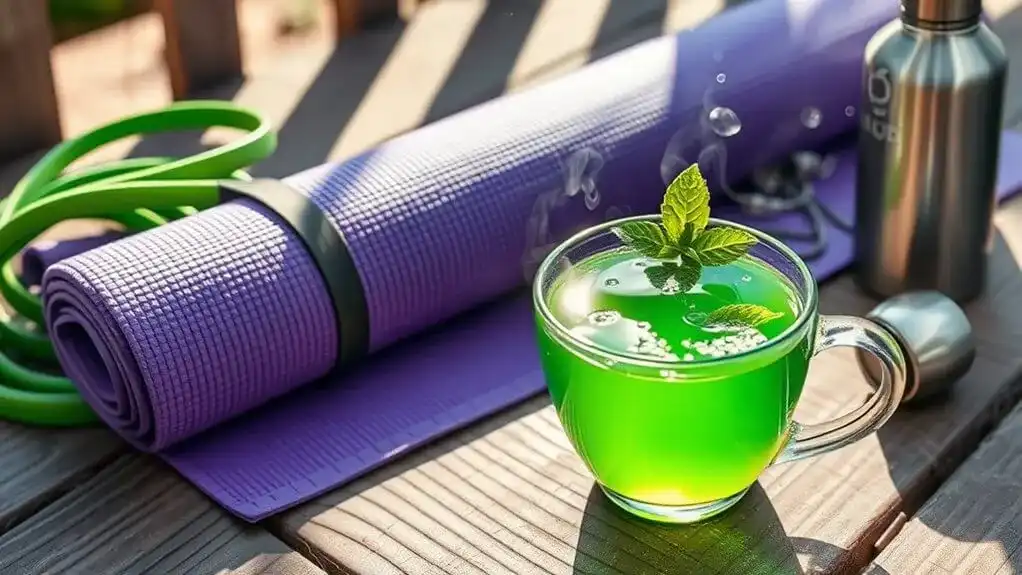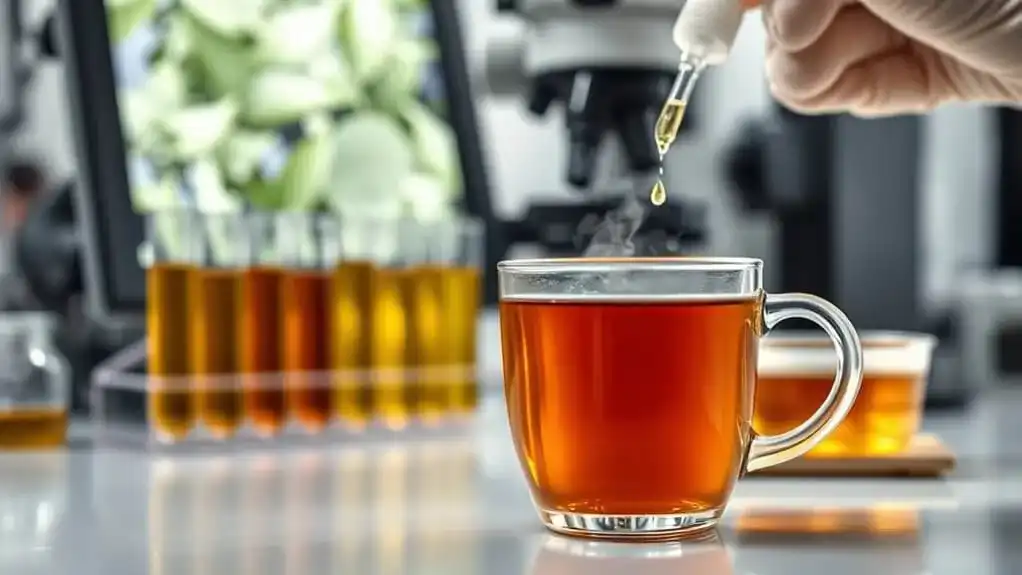Science reveals that mindful tea drinking reduces stress through powerful compounds like L-theanine and EGCG. These elements promote alpha brainwave activity and lower cortisol levels, with tea drinkers showing a remarkable 4% decrease in anxiety after stressful situations. When combined with mindful preparation rituals, tea's biochemical benefits create a state of alert calmness without drowsiness. Modern research continues to validate what ancient wisdom has known for centuries about tea's transformative properties.
Key Points
- L-theanine in tea promotes alpha brainwave activity and creates alert calmness without drowsiness, supporting relaxation and mental clarity.
- Tea drinkers show significantly lower cortisol levels and recover faster from stress, with post-stress levels at 53% of baseline.
- The combination of L-theanine and caffeine enhances both relaxation and cognitive performance when consumed through mindful tea drinking.
- Mindful tea rituals engage multiple senses and establish consistent mindfulness practices, promoting emotional balance and stress reduction.
- Scientific studies confirm tea drinkers experience only 4% anxiety increase post-stress, compared to 25% in non-tea drinkers.
The Biochemistry of Calm: Understanding Tea's Stress-Fighting Components
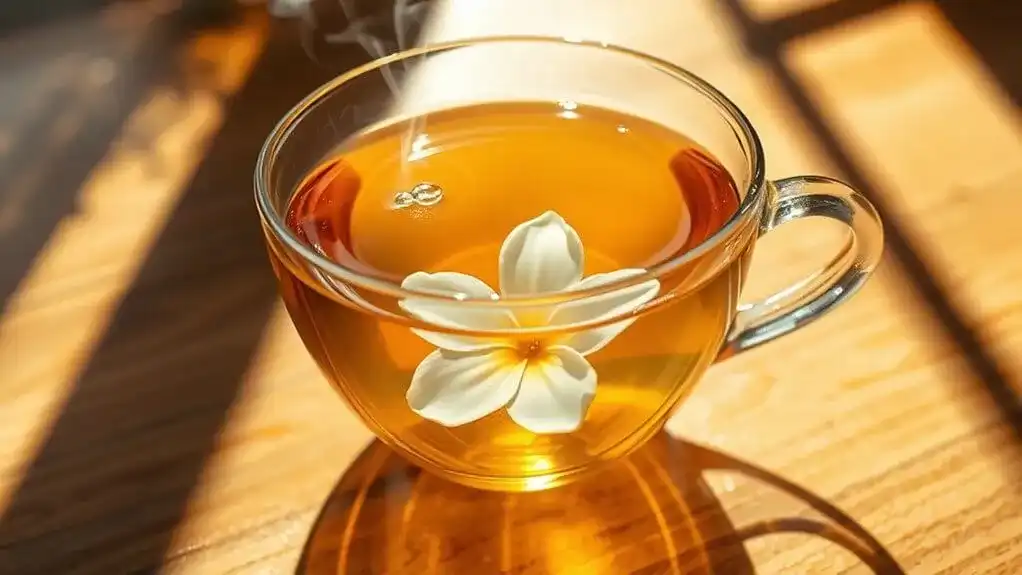
While many people drink tea simply for its pleasant taste, the beverage's stress-fighting properties stem from a complex interplay of biochemical components. Theanine effects lead the way by promoting alpha brainwave activity, though its effectiveness depends on maintaining the right caffeine balance. EGCG benefits contribute greatly to stress reduction through neurotransmitter modulation, particularly when working in harmony with other compounds. Research shows that tea consumption can lead to a 4% anxiety decrease when consumed after stressful situations. Regular consumption of L-theanine has been shown to promote better sleep quality through its relaxing effects on the brain. For optimal stress-relieving benefits, tea should be steeped at 50-80 degrees Celsius for 2-3 minutes.
Certain teas, especially oolong varieties, serve as notable GABA sources, enhancing the drink's calming properties through autonomic nervous system regulation. The arginine role in stress reduction becomes more pronounced when combined with theanine, while catechin interactions help regulate neurotransmitter release. Together, these compounds create a symphony of stress-fighting mechanisms that make tea more than just a comforting beverage.
Mind and Body Benefits: How Tea Transforms Your Stress Response
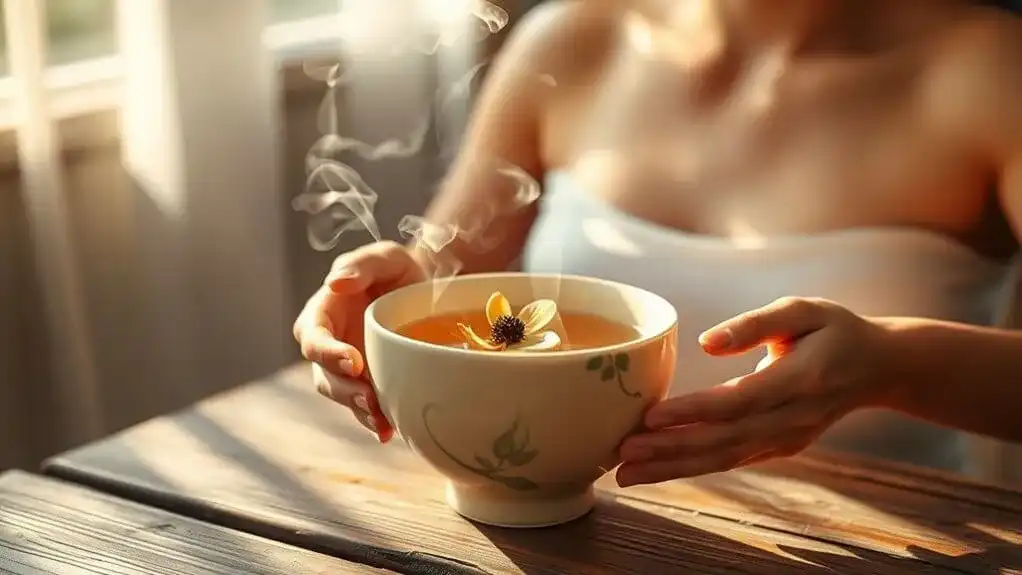
The biochemical components in tea create measurable changes in both mind and body during stressful situations. Research shows that tea drinkers experience lower cortisol levels and reduced platelet activation compared to non-tea drinkers. The effects extend beyond physiological benefits, as tea rituals promote mindfulness and enhance subjective relaxation during recovery periods. Being present in the moment through mindful tea drinking allows deeper awareness of thoughts and emotions.
Tea's stress alleviation properties work through multiple channels. L-theanine, a key compound, boosts alpha brain wave activity, creating a state of alert calmness without drowsiness. The parasympathetic nervous system activates during tea consumption, helping eliminate anxiety. Studies reveal that tea drinkers show a 4% decrease in anxiety levels after stressful tasks, while non-tea drinkers experience a 25% increase. These benefits are amplified when people engage in mindful tea drinking, focusing on the sensory experience and creating peaceful moments.
Ancient Wisdom Meets Modern Science: Tea's Role in Mental Wellness
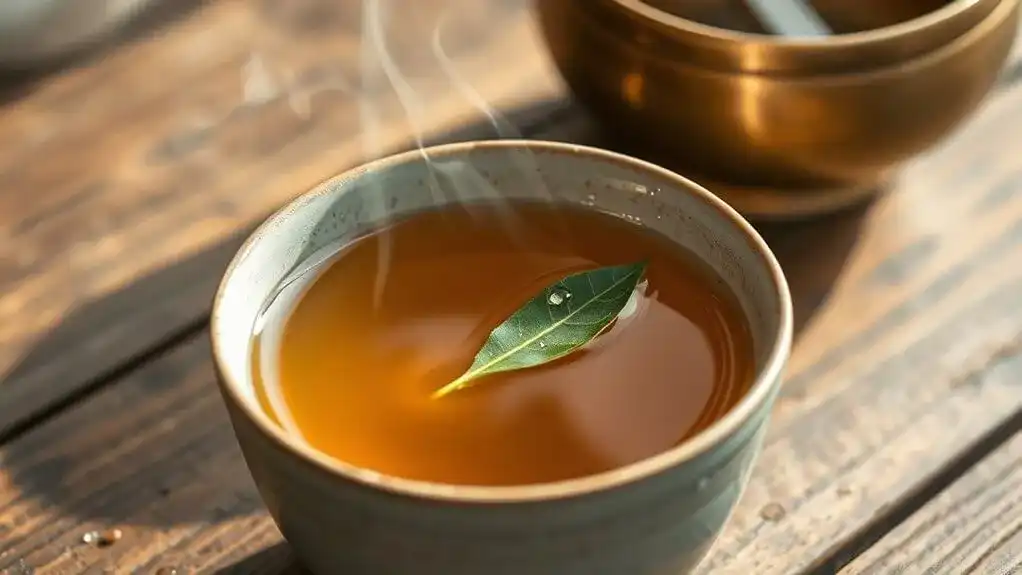
Modern scientific research has validated what ancient cultures understood intuitively about tea's profound effects on mental wellness. Studies have identified specific compounds like L-theanine and epigallocatechin gallate that reduce stress, inflammation, and cortisol levels. This scientific evidence aligns perfectly with tea's cultural significance throughout history. High-quality loose leaves provide more concentrated levels of these beneficial compounds than standard tea bags.
The power of tea extends beyond its chemical composition through mindful tea rituals that promote mental well-being:
- Traditional ceremonies emphasize harmony, respect, and tranquility
- The act of preparing tea serves as a meditative practice
- Regular tea consumption helps prevent cognitive decline and depression
Today's understanding of tea's stress-reducing properties bridges ancient wisdom with modern science, confirming that historical tea practices weren't just cultural traditions—they were sophisticated approaches to mental wellness that continue to benefit people worldwide. The presence of L-theanine amino acid in tea helps promote relaxation while maintaining mental clarity. By engaging all senses during preparation, from watching the steam rise to hearing the water pour, tea drinkers can create moments of stillness in their daily routine.
The Art of Mindful Tea Drinking: Maximizing Stress Relief
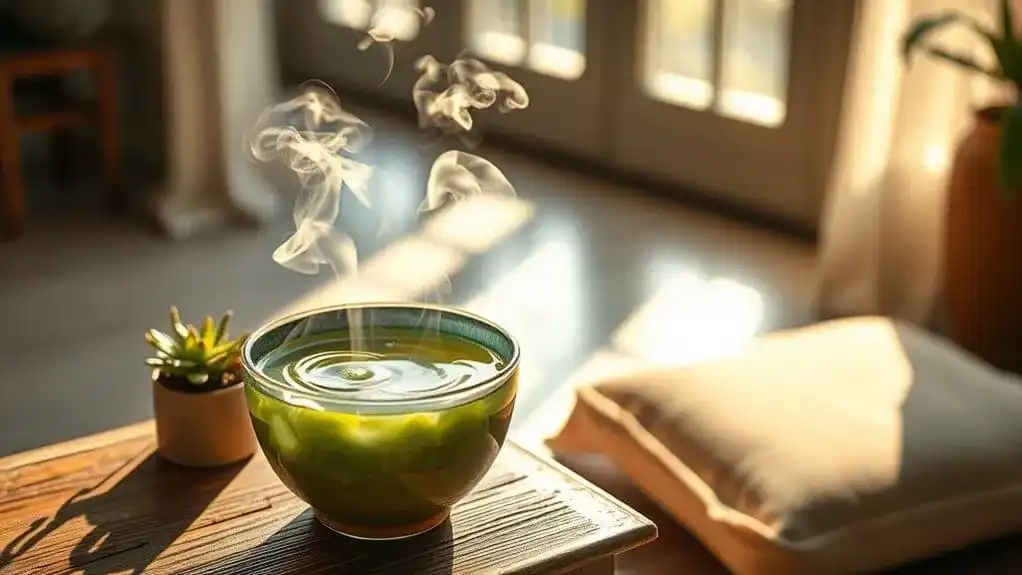
Mindful tea drinking transforms a simple daily ritual into a powerful stress-relief practice that combines sensory awareness with intentional relaxation. Through mindful preparation, practitioners carefully select teas that align with their emotional needs, whether it's calming chamomile for anxiety or invigorating green tea for focus. Setting aside specific time daily helps establish a consistent mindfulness practice.
The process emphasizes sensory engagement at every step, from observing the water's gentle simmer to inhaling the tea's aromatic steam. As tea steeps, drinkers notice the changing colors and embrace the warmth of the cup in their hands. The amino acid L-theanine in tea helps create a state of alert calmness during this mindful practice. This intentional approach creates a peaceful space for reflection and self-awareness, allowing stress to dissolve naturally. When paired with meditation or practiced in a quiet environment, mindful tea drinking becomes more than just consuming a beverage—it's a gateway to improved mental clarity and emotional balance.
Research-Backed Evidence: Clinical Studies on Tea's Stress-Reducing Effects
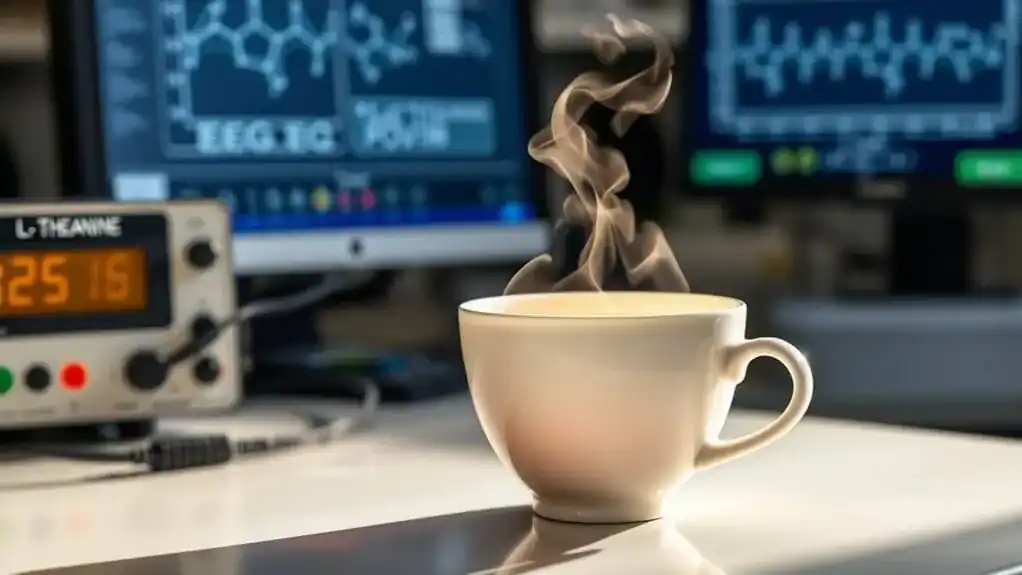
Scientific research has consistently validated tea's reputation as a powerful stress-reducing beverage through numerous clinical studies. Research shows that regular tea consumption leads to significant cortisol reduction, with tea drinkers experiencing post-stress cortisol levels at just 53% of baseline compared to 73% in placebo groups.
Key findings from clinical studies highlight tea's remarkable stress-reducing properties:
- The combination of L-theanine and caffeine enhances relaxation while improving cognitive performance
- Black tea drinkers show faster recovery from stress-inducing tasks, with rapid decreases in saliva cortisol levels
- Tea's stress-relief benefits stem from both its chemical compounds and the calming ritual of preparation
Studies show that green tea catechins can comprise up to 42% of the dry weight of brewed tea, contributing significantly to its therapeutic effects. These evidence-based results demonstrate why tea has remained a trusted remedy for stress management throughout history. Ancient Chinese practitioners recognized tea's medicinal benefits and utilized it for its therapeutic properties thousands of years ago.
Conclusion
Isn't it remarkable how a simple cup of tea can bridge ancient wisdom with modern science? Tea's stress-reducing properties aren't just folklore – they're backed by compelling research showing how its compounds interact with our body's stress response systems. By combining mindful drinking practices with tea's natural calming elements, we're tapping into a powerful tool for modern stress management that's both accessible and scientifically sound.
